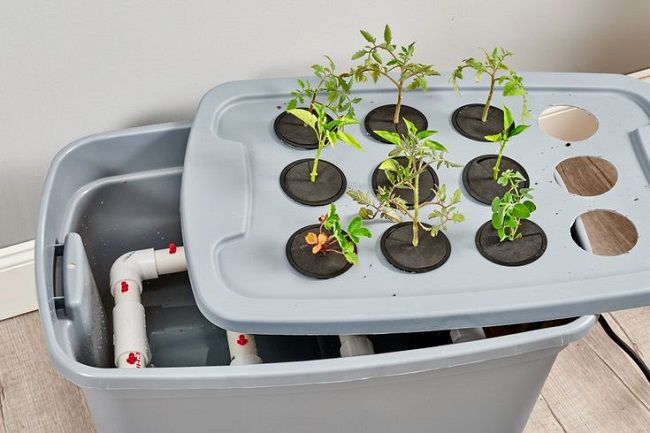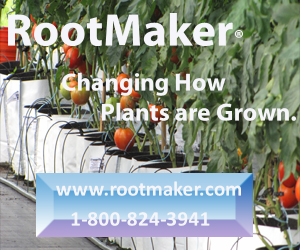
Once a system is designed and built, it is now a self-contained hydroponics system that will virtually run itself. There still may be some problems to deal with but if you are vigilant, you can catch them early and eliminate most of them.
First and foremost, in my opinion, is to plan now for some means to support your plants as they grow. For a hydroponics system that is not using growing medium this is especially important. Even with growing medium it is rarely dense enough to keep your larger plants from falling over when they reach a certain size. I’m talking plants with solid stems growing a couple feet like a green pepper.
And don’t be fooled…like I was. A hydroponics plant will grow larger, faster and bear more fruit or vegetables than a similar plant that is grown in soil. I tested this when I started growing with hydroponics. It was not a scientific test, but the beans grown in the hydroponic system produced faster and had far superior yields when compared to the beans grown in soil.
Now back to the point. To keep a hydroponics system complete, meaning running smoothly and efficiently, there are certain periodic maintenance duties to perform to keep your growing system healthy. Let’s start with tasks that should be performed daily, or every other day if you want.
Hydroponics System Daily Maintenance Check List
Once a growing system is up-and-running, to successfully grow hydroponic plants, there are only a few tasks required. Check the system daily or every other day and do the following keeping in mind the 5 basic requirements of plants which are light, water, nutrients, temperature, and oxygen.
Misting
Most plants love humidity so mist them continually and they will be happy.
Observe
Watch the system and make sure it is performing properly. If it floods the plants and drains at a specific time – verify this. Small bits of growing medium can clog the tubing of a system very quickly and either leave your plants ‘high and dry’ or continually flooded.
Top it Off
As your nutrient solution evaporates, add tap water to refill it to where it should be. Do not ever add a touch more of nutrient powder to replace what you think has been used up. This is a really good way to kill your plants.
Pests
Keep an eye out for pests and disease as well as nutritional deficiencies.
Act Immediately
Take care of any problems as fast as possible or they will grow into large problems faster than you will believe.
Adjust the Nutrient Solution
Look at the plants. Are they wilting and is the growing medium completely dry? Or is it continually soaked? Adjust the amount of nutrient solution accordingly (this is for systems that periodically receive nutrient solution most likely through a timer).
Remove Dead Matter
Dead growth saps the energy of a plant and can be a good beginning for a disease or pest problem so keep the dead matter pruned.
Ventilation
Keep track of the temperature if you are in a greenhouse and ventilate, if necessary, by opening the greenhouse doors, windows and turning on a fan.
Pollination
In an enclosed area like a greenhouse, let some bugs and breezes get in. This not only helps with pollination, but some bugs will protect your plants by eating the bad ones.
Encourage Good Bugs
Learn to identify the good vs. bad bugs. This chart can help you identify the bad bugs that you don’t want in your greenhouse. Dragonflies, spiders and ‘daddy long legs’ are good to have around, as they eat the bad bugs so encourage them. I personally love dragonflies – I’ve seen them dive-bomb horse flies and moose flies and eat them.
Keep a Log
Keep a log. What becomes second nature to you now will probably be completely forgotten in a few months so write it down.
I know this seems like a lot of effort but once you get a routine down you may not need more than a few minutes a day to perform these tasks. Keep up the vigilance and you will grow hydroponic plants that are healthy, and you will be amply rewarded with large amounts of vegetables and herbs.
Larry Maki is an avid, self-taught hydroponics gardener from Connecticut with a passion for alternative types of gardening.
Related Articles & Free Email Newsletter Sign Up
Container Hydroponic Systems are Great for Beginners
How to Use Predatory Insects for Pest Control
Passive Hydroponics for the Home Hobby Grower



Comment here